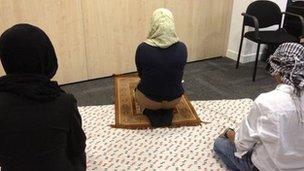Alternative mosques for all genders and sexualities
- Published

Apart from allowing women in to pray, IMI says they can lead the prayers
At a meeting in a basement in north London, the evening prayer led by a woman has just finished.
Those present are now involved in a discussion on Islam and why people choose to stay with it, despite the negative press it gets.
It is the initiative of a group of Muslims who want to open alternative mosques in the UK that would allow men and women to pray side-by-side and welcome gay people.
The Inclusive Mosque Initiative (IMI) was set up in November last year.
Its UK co-ordinator Tamsila Tauqir said: "We want to offer Muslims an alternative space in which they can pray and meet.
"We will not discriminate against anyone, they can be Sunni or Shia, straight or gay, people with families and people without."
The IMI said women could also lead the prayers.
Many mosques still do not allow women to partake in communal Friday prayer because they either do not have the room or believe in segregation.
Imam Adnan Rashid, from the London-based Islamic think-tank The Hittin Institute, said: "The orthodox values of Islam are very clear.
"Muslims already believe in things that have been established for them for centuries and they are not going change.
"The Koran is not going to change, the prophetic position is not going to change. Muslim thinking and practices are not going to change.
"So I don't know what the point of this mosque is."
Tamsila Tauqir tells 5 live 'We want to appeal to young people and converts'
The BBC contacted Islamic groups which represent institutions and places of worship in the UK, including two of the largest - The Muslim Council of Britain (MCB) and the Mosque and Imams National Advisory Board (MINAB).
They both declined to comment.
The Lancashire Council of Mosques, which represents about 60 mosques, also failed to respond.
And the new movement has received a mixed response from worshippers.
'Distracting for men'
Outside a newly-built mosque in Blackburn, Lancashire, Mohammed Shahid said: "I think it's not right for men and women to go to the mosque together.
"It can be distracting for men, some are not good with women, so women should pray at home."
His friend, Shazad Khan, said: "I don't think homosexuals should be allowed in to the mosque, they are not Muslims. How can they go for prayers?"
Ali Noor said: "I think it's a good idea, it promotes equal opportunities especially for the disabled. Provision should have been made for them a long time ago but it hasn't."
'Issues with patriarchy'
At the IMI meeting in north London nobody wants to be named for fear of repercussions from the community.
But one Muslim man said: "We have issues with patriarchy in the mosques, whereby even if women are allowed in they are not given any representation.
"They have to speak through a male figure which I don't think is Islamic or fair."
Asked if he thought the movement would ever gain mass support, he said he hoped it would act like a beacon.
He said if people realised there was an alternative then they would move towards it and even if they did not go to IMI, he thought that other mosques would be affected.
A practising Muslim student in her 20s said: "No-one is here to set the rules about how you should live.
"It's a lot about how you understand the text and you can come to any conclusions about Islam yourself, without having to go to an imam or a community leader."
International mosques
Although they have a small following in the UK, it is part of a growing global network with sites in Srinagar in India and Kuala Lumpur in Malaysia.
They also have support networks in the US, Canada, South Africa, Australia and Sweden. Their ultimate aim is to set up a network of international mosques.
Ms Tauqir knows that their actions could be seen to be provocative.
She said: "In some people's view it is controversial. For us what we are trying to do is to create a space that is welcoming.
"We want to show the mainstream community that we are not all extremists, we are a variety of people."